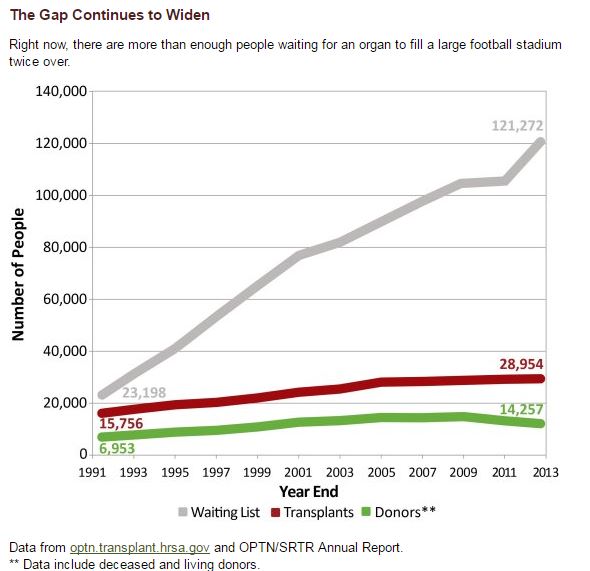
It's not a topic that we typically jump at the chance to discuss, but mortality is a very real fact. In your health care training, you'll inevitably come into contact with the topic and it might just lead you to reflect on yours.
As sobering as this topic usually is, it doesn't have to be. What if you knew that upon your death, you could actually save eight lives? You can. By becoming an organ donor.
As this infographic points out, although 98 percent of adults in the United States have heard of organ donation and 90 percent say they support it, only about 45 percent are registered as organ donors.
April is Organ Donation Month. It's a time where organizations and groups across America engage in important conversation and encourage others to consider the gift of life.
With an average of 21 people dying each day because they can't get the organs they need, now is the time for action.
Consider this Visual Representation

When You Choose to Give
How does your choice affect eight unique lives? When you choose to donate, you can give the life-saving gift of your:
- Heart
- Kidneys
- Lungs
- Pancreas
- Liver
- Intestines
- Corneas
- Skin
- Tendons
- Bones
- Heart Valves
While the majority of donations take place upon death, in 2014, nearly 5,000 transplants were made possible by living donors.
According to the United Network for Organ Sharing, "The kidney is the most commonly transplanted organ from a living donor... A living liver donation, where a segment of the donor's liver is transplanted, occurs less often, and the donor is usually related to the recipient. Also, in rare cases, a segment of organs such as lung, intestine or pancreas can be transplanted from a living donor."
How to Become a Donor
The most important thing to do is to sign up as an organ and tissue donor in your state's donor registry.
To cover all bases, it's also helpful to:
- Designate your decision on your driver's license
- Tell your family about your donation decision
- Tell your physician, faith leader, and friends
- Include donation in your advance directives, will, and living will
What objections have you heard to not becoming an organ donor? Share with us in the comment section and maybe we'll put a myth buster edition together using your suggestions.
Take The Next Step Towards a Brighter Future
We have a Concorde representative ready to talk about what matters most to you. Get answers about start dates, curriculum, financial aid, scholarships and more!




